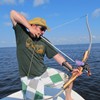
Imagine swimming out from the beach on a warm, summer day. You feel a tingle in your spine and the ba-dumping chords of the Jaws theme inexplicably rise from your subconscious. There is something in the water and it is going to kill you. The deadliest creature in the ocean has chosen you, and there is no escape. You panic. You scan the waves, searching for a sign, something that reveals the threat. Where is it? What is it?!
You could be forgiven if you think, perhaps due to that ominous tune, a shark is stalking you. Despite their killer reputation, sharks rarely attack people and shark attacks, when they do occur, are rarely fatal. Perhaps you are fresh from a Marine Invertebrate Zoology course and your nightmares are now filled with images of cubozoans, the deadly box jellyfish. Box jellies may be extremely venomous, but they are responsible for less than 50 deaths a year and envenomation results in approximately a 20% mortality rate. Ah, but you’re clever, and you watch Discovery channel specials about the “Ten Most Deadly X in Y”, so you know that the deadliest creature is the ocean is the lethal sea snake, relative of the cobra. Clearly one must be stalking you through the shallows. Wrong. While sea snake venom is quite potent, only 1 in every 10 bites results in envenomation, and even then, the mortality rate is a comforting 10%.
No matter how hard you look, you won’t see the monster slowly gliding up behind you. The deadliest marine organism is not a shark, a jellyfish, or a snake. It is not the beautiful blue ring octopus or the unassuming cone snail. It is not the giant squid, the killer whale, or the murderous, man-eating, manatee. The undisputed king of maritime mortality is the lowly bacteria, Vibrio vulnificus.
Read More “Flesh-eaters of the Crystal Coast: why I prefer my oysters roasted” »
